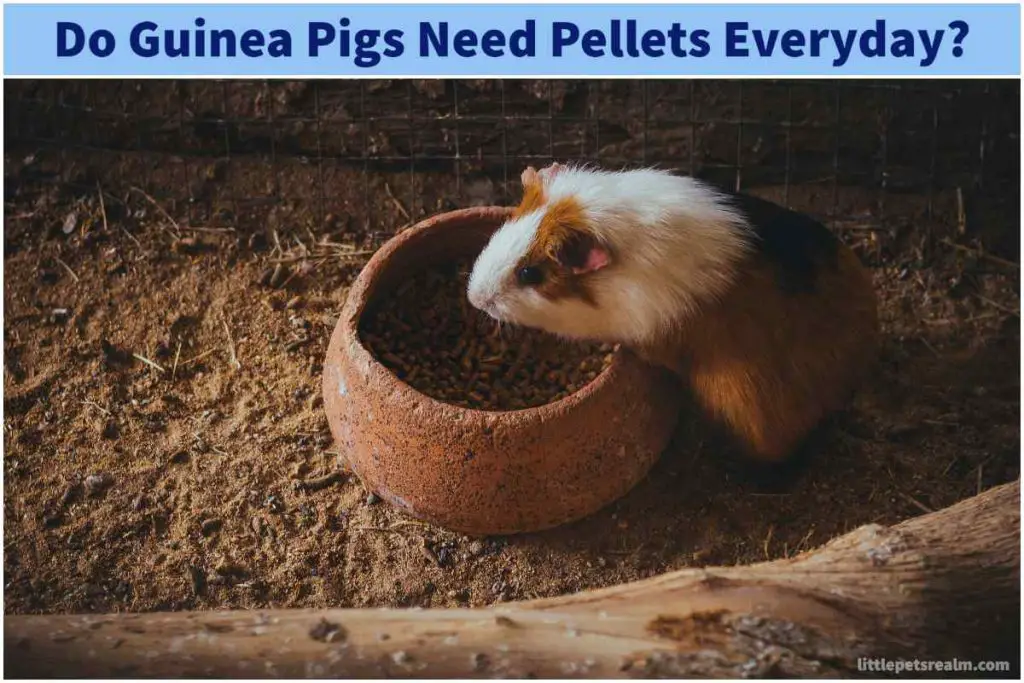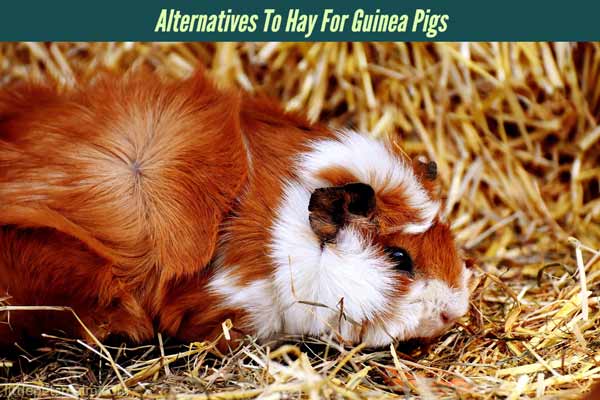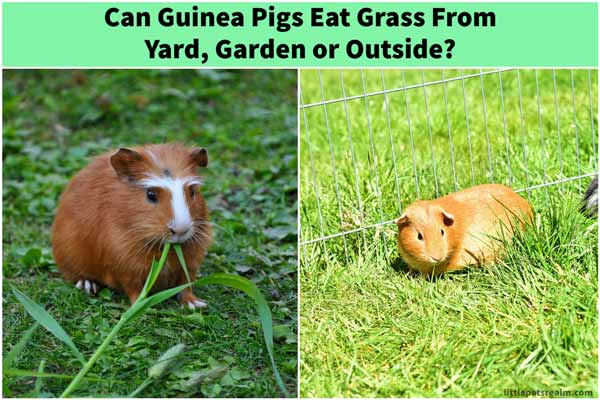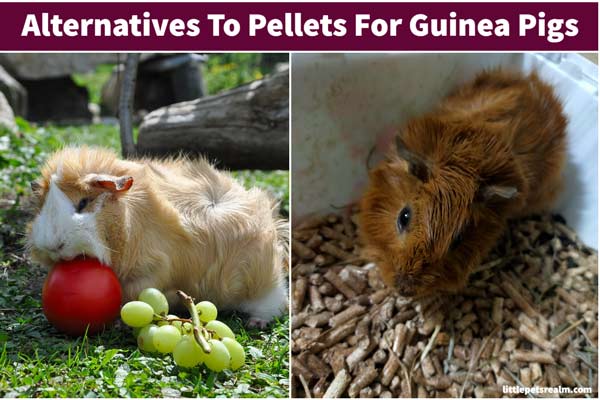Guinea pigs need a healthy diet to maintain their body and keep them free from diseases. You might know how popular pellets are among guinea pig owners. But, do guinea pigs need pellets every day?
Pellets play an important role in the guinea pigs’ everyday diet chart to fulfill the requirements of vitamin C, vitamin D, other vitamins, and minerals and help you calculate the daily intake of nutrition. However, you don’t need to feed pellets to your guinea pigs every day if you can provide them with fresh vegetables and fruits and maintain a balanced diet measuring the nutritional value.
Yes, guinea pigs won’t die if you don’t feed them pellets every day. But, it’s difficult to do the proper calculations if you feed your little piggies vegetables and other foods. So, you may need pellets as you can do this with them.
Besides, there are a lot of benefits of pellets that you should consider.
In this article, you will know all the pros and cons of feeding guinea pigs pellets every day and find out how long they can live without pellets.
Table of Contents
Why do guinea pigs need pellets every day?

Let’s know why your guinea pigs need pellets every day.
Fulfills vitamin C requirements
Guinea pig’s bodies can’t produce vitamin C and if they don’t get proper amounts of Vitamin C daily, they will have scurvy and other diseases. Many guinea pigs also die from that. So, you need to provide them with Vitamins C supplements.
To serve this purpose pellets help you. Just you have to choose pellets that contain Vitamin C as some products may not have it. Vitamin C is also important to support teeth and bone health.
Calculates nutrients value
The list of nutrients with their value is labeled on the product. So, it helps you to measure how much nutrients your piggies get every day. You can’t calculate easily if you give them only other foods. But, pellets can make sure that your piggies get enough vitamins and minerals.
Ensures balanced diet
Hay is the main food for guinea pigs. But, they also need a balanced diet as hay can’t meet all the nutritional requirements. Pellets can provide those nutrients that hay can’t.
Contains vitamin D
Vitamin D is essential for the piggies that live indoors as they don’t get sunlight. Vitamin D is also very important to fight different diseases.
Provides vitamin and minerals
Pellets come in different varieties based on the nutrients on them. If you give the piggies the right pellets that contain all essential vitamins and minerals, they can meet the daily requirements quite easily.
Rich in fibers
Good brands offer pellets that are high in fiber. Fiber is an essential nutrient for guinea pigs as they are herbivores. Fiber improves their digestion and keeps them healthy.
Helps fight various diseases
Pellets can fulfill all the important nutrients that you may not provide them because of the unavailability of certain foods. So, there is less risk that the guinea pigs will have any diseases as a result of vitamin and mineral deficiency.
Boosts immunity
If you feed your guinea pigs pellets daily with hay and fresh vegetables, it will enhance their immunity. All work great together to make your guinea pigs strong and healthy.
Maintains dental hygiene
If you pick a well-known brand, it will also allow the little piggies to maintain good dental hygiene.
Provides important fatty acids
It’s great if you can make sure pellets contain Omega-3 and omega-6 fatty acids. Omega-3 fatty acid supports their heart health and omega 6 gives them healthy skin.
Helps maintain protein and calcium levels
Pellet foods not only contain vitamins and minerals but also contain protein that will help build your guinea pig’s body. Besides, pellets contain calcium in adequate amounts considering the fact that high calcium will cause gallstones.
Helps getting rid of grass-only diet
Hay or dried grass is essential for guinea pigs, but you can’t provide a grass-only diet. It’s not good for their health and mood. So, sometimes pellet can be a supportive diet for them to give them different tastes.
Easily available and cheap
You can get pellets from anywhere in the world now. But, you may face difficulty finding all the foods or vegetables that guinea pigs need. Keeping that in mind pellets are specially made for the owners to help them supply the piggies. Moreover, the price of pellets is also very reasonable.
When do your guinea pigs need pellets every day?
You have to offer pellets to your guinea pigs every day in the following situations.
1. Living in an area where you don’t get enough fresh vegetables
It may be difficult for you to find a variety of vegetables every day for your guinea pigs, especially when you live in an area where different kinds of vegetables may not be available. In that case, you need to take help from pellets.
2. Maintaining vitamin C
If you can’t provide your piggies, with Vitamin C-rich foods, you must provide them pellets that contain Vitamin C. Without vitamin C they get sick and develop scurvy.
3. Offering a balanced diet
If you see, foods or vegetables can’t ensure all the nutrients that they need, you must seek help from pellets.
4. Preventing vitamin and minerals deficiency
Sometimes, you may not get a certain vegetable that meets a certain nutritional requirement for your piggies. In those circumstances buy a pellet food that can ensure that nutrients.
5. Running out of hay
Hay is a must-need food for your guinea pigs. But, if you run out of hay someday, you may feed them pellets that contain the same nutrients. But, keep in mind that, only do that in an emergency, not more than 1 day. Hay can’t be replaced by any other foods, not even pellets.
How much pellets should a guinea pig eat daily?
A two pound guinea pig may need ⅛ cup of pellets daily. In addition, make sure that they get ½ to 1 cup of fresh leafy and vitamin C-containing vegetables every day. The amount of pellets also depends on the other foods that you provide and the response of your guinea pigs to the pellet.
However, in the beginning, start with a large number of pellets and see how much he can eat. Soon you will learn the number of pellets that you should provide them.
However, don’t depend on pellets, as it’s important but not the primary food for them. Moreover, be careful that if your little piggies eat too many pellets, they may get overweight soon. It’s bad for their health.
What food should you feed your guinea pigs along with pellets?
Pellet foods alone can’t maintain your guinea pig’s body and keep them healthy. So, what are those foods that your guinea pigs need along with pellets?
Unlimited Hay
First of all, you need to provide your guinea pigs with unlimited hay daily. Hay is their main food, contributing to 80% of their diet.
Hay provides them with high fibers and maintains a digestive tract. Abrasive silica presented within hay is necessary to control their tooth growth.
Varieties of Vegetables
You have to also offer them 1-2 cups of fresh and green leafy vegetables that contain vitamin C every day. Give veggies two times a day if you can’t provide them pellets.
But, if you can’t offer them a good amount of veggies, you must give them pellets.
They can’t produce vitamin C on their own. However, if your pellets contain vitamin C, it will be easy for you. You can also give them fruits once or twice a week.
If you can’t give them pellets, make sure they get adequate amounts of sunlight to produce vitamin D.
You can also offer two meals one with pellets and the other with mixed vegetables or ColeSlaw. You can mix various veggies such as cucumbers, carrots, grapes, celery, lettuce to make the ColeSlaw.
Water
Guinea pigs require a lot of water. So, ensure a lot of clean and fresh every day.
Fruits and treats
Offer them treats occasionally, Fruits, and treats containing a lot of sugar. So, you should not give too much.
Also, check out what to feed your guinea pig instead of pellets.
How long can guinea pigs go without pellets?
Guinea pigs won’t die if you don’t give them pellets in their diet, but you have to make sure that you feed them unlimited hay and adequate amounts of fresh leafy vegetables, fruits, and vitamin C supplements. If you can’t maintain a balanced diet they may get sick quickly. Vitamin C deficiency can cause serious illness and can be fatal because the body can’t manufacture it.
Without pellets, you have to add more fresh vegetables to the diet, approximately 2 cups per day. Also, provide them with more green leafy vegetables that contain vitamin C.
There are many owners who don’t use pellets and keep their guinea pigs healthy. In that case, you need a proper diet chart to ensure all the nutrition for the piggies.
Learn what guinea pigs can eat instead of pellets.
Why won’t my guinea pig eat his pellets?
Some guinea pigs don’t like a certain kind of pellets, maybe because of the ingredients and some for added flavors or taste from a certain brand. Some piggies also prefer natural foods like vegetables to pellets, because of their wild nature. If your guinea pig has any health issues or digestion problems, they may also reject the pellets.
What pellets should I feed my guinea pig?
There are various types of pellets available in the market. All aren’t good for guinea pigs. Some pellets may cause digestion problems, body swelling, and other complications.
Provide your guinea pigs with natural and fresh pellets that come from grass or plants. Moreover, offer pellets that are designed for guinea pigs only, not for rabbits and other small pet pellets. Pellets that are made from timothy hay-based or a mix of ingredients that contain essential nutrients for guinea pigs are the best choice.
Ingredients of pellets are extremely important. You will get different products with different combinations of nutrition.
Some pellets are based on alfalfa hay, which’s only important for pregnant and baby guinea pigs under 6 months. You can’t give it to adult piggies, because it contains high calcium and leads to bladder stones.
So, if you choose hay-based pellets, you should pick timothy hay-based pellets.
Ensure the pellets contain vitamin C, vitamin D, fibers, and other essential minerals and vitamins for guinea pigs. It should not contain fillers, colors, scents, added chemicals, or any ingredient that’s harmful to piggies. Stay away from sugary and high-carb pellets.
Rabbits and other small pet pellets are different from guinea pigs. So, never think of giving that to your piggies.
So, you need to be careful of picking a good product for your piggies.
Top 3 pellet foods that you can offer your guinea pigs everyday
1. Guinea Pig Food Pellets by Small Pet Select
2. Hartz Food Pellets for Guinea Pig
3. Wild Harvest Advanced Nutrition Diet
What are the drawbacks of pellets for guinea pigs?
Let’s take a look at the cons of pellets for which it’s an additive food to the main diet.
Low amount of fiber
Though pellets contain fibers, the amount isn’t high like hay or fresh grass. A rich fiber diet is mandatory for guinea pigs.
Not having any dental health benefit
Some people think they will provide pellets as an alternative to hay. They may get all the nutrition from pellets as hay, but it doesn’t contain abrasive silica. It’s necessary to prevent excessive growth of their teeth.
May cause overweight
Vegetables or hay may not be responsible for your piggy’s obesity. But, eating a lot of pellets can make them fat and that’s not good for their health.
Need to choose a good product
If you can’t find a good quality product, pellets may be bad for guinea pigs. So, you should ensure a product that’s specially prepared for them and maintain nutritional value.
If you don’t want to feed it, you can check out the best alternative to pellets for guinea pigs.
Takeaways
Guinea pigs don’t need pellets till you keep providing them unlimited hay and 1-2 cups of fresh leafy vegetables every day. However, if you can’t offer them veggies with high vitamin C and vitamin D regularly and can’t measure the daily intake of all the nutrients, you should feed them pellets daily. But, you always need to maintain a balanced diet with hay, fresh vegetables, and pellets to keep them healthy.
FAQ on Pellets for guinea pigs
Do guinea pigs need pellets in their diet?
Guinea pigs need pellets in their diet if you can’t ensure the required amount of Vitamin C, vitamin D, minerals, and other essential nutrients from natural sources such as vegetables. Pellets help you measure the daily intake of nutrients and offer those vitamins and minerals that you may not get due to a limitation like the unavailability of certain vegetables in the local market.
Can guinea pigs eat pellets instead of hay?
You should never use pellets as an alternative to hay unless you run out of hay or have an emergency. Even if you can’t provide them hay, you can choose fresh grass that’s not chemically treated. Pellets take part in the guinea pig’s diet chart as a supportive food in addition to hay.
Do pellets replace vegetables for guinea pigs?
Pellets can’t replace fresh and leafy vegetables as guinea pigs require natural foods more. So, if you get all the varieties regularly and provide them with the required amount, fresh vegetables are a better option. However, it’s hard to maintain this task for many owners. So, pellets are the best choice to meet the need for many nutrients offered by certain vegetables.
Are pellets good for guinea pigs?
Pellets are good and safe for guinea pigs, as they contain essential nutrients for them. However, you have to ensure you get pellets from a well-known brand that ensure it doesn’t contain any fillers or added chemicals. Besides, check the label of the product to know if it provides all the nutrients that your little piggies need.
Can you feed your guinea pigs just pellets?
You should never feed your guinea pig just pellets, as hay is their primary diet (80% of all) to maintain their digestive system and dental health and fresh vegetables are also essential to boost their immunity and prevent various diseases.
Do guinea pig pellets go bad?
Pellets aren’t bad for guinea pigs unless you buy a bad product. If the product contains filler and other unnecessary ingredients, it will act like junk food and can be bad for their health. However, good brands provide pellets that are safe for guinea pigs’ health and offer valuable nutrients.
How much do guinea pig pellets cost?
10 pounds of Pellets for guinea pigs may cost you from 20-30$ depending on the brand and ingredients. You shouldn’t go for a cheaper product, as it may contain filler and low-quality ingredients that can be harmful to your guinea pigs.

I am Pallab Kishore, owner of Little Pets Realm. I share important tips, advice and answer all the queries to solve various problems about small pets such as guinea pigs and hamsters on this website.



